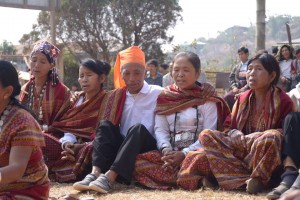53.3% of Chin people are relying for their health on untrained village health practioners
CAD (Community Agency for Rural Development) which is a Myanmar registered local charity organization (www.cadmm.org), surveyed 1661 people (40 villages, 400 households) to know affect of cultural barriers to health access and services in two townships (Hakha and Than Tlang townships) in the central part of Chin state, Myanmar in May 2015. The respondents are 767 male and 894 females. Here are its findings;
When they are sick, it is reported that 53.3% of respondents go to untrained village health practitioners, 29.4% to government physicians and 12.8% to NGOs. Basic levels of understanding around food hygiene are low among both men and women. Only 6% of respondents said they regularly speak with their partner about their sexual health. And only 11% would like to help teach their children about sexual health. Men are expected to be the main breadwinners for a household and 90% of the time this is in agriculture. There is a lack of diversity of job opportunities and for many, a low coverage and quality of basic education closes the door to the few alternatives that do exist.
With agriculture being the main source of income this means that there is stress on them to produce food, income and a good domestic setting. There was a high incidence of female reproductive health issues and this correlated with 90% of households surveyed not having access to private body washing spaces. CAD understands this as an intrinsically gender-interrelated issue whilst also noting that poor levels of male personal hygiene are more likely to lead to female problems.
85% of households had women as the main responsible adult for childcare in the family. And with family sizes averaging 6-8 people in Chin State, this is essentially indenturing females to the house for the majority of their working age. An overwhelming 96.5% of women said they would like better access to a female health practitioner. Private washing spaces were recorded for only 9.5% of households, with 86% of people washing their entire bodies only once or twice a week. A particularly interesting result for CAD was to see how few people discuss sexual health issues with their partners and their children. Despite this, there is a gradual generation-on-generation trend towards more openness – 4% of respondents said their parents talked to them about it, 6% said they talk to one another about it, and 11% said they would like to talk to their children about it. So whilst the levels are low, society does seem to be overcoming certain barriers here. We hope that our Stage 2 programming can facilitate this change more quickly, in a positive way and in-line with the communities’ values.
The most stark finding came from the final two questions of our survey designed for women – ‘do you have easy access to a female health practitioner’ and ‘would you like to have better access to this service’. For this, 7% said they do, and a comprehensive 96.5% said they would like access / better access to this service.
A general trend located across all findings was a significant difference between Than Tlang and Hakha townships. The variations were not simply located in access to services, but also in lifestyle and values. As an example, when asked whether they “ever discuss personal or family health issues with friends?” 53% said yes in Hakha villages whilst 94% said they did in Than Tlang villages. Whilst opinions were quite socially conservative across the townships, Than Tlang values tended to be more so, for example in relation to discussing sexual health the 11% who said they will or have spoken to their children about it (figure quoted above) was a clear median between 22% in Hakha and only 2.5% in Than Tlang. It is this kind of difference in values that has stressed to us the importance of programming dynamic and responsive to different social environs.
1810 Views








